牛津译林版九年级英语上册Unit4 Growing up Grammar 课件
- 格式:ppt
- 大小:671.50 KB
- 文档页数:17
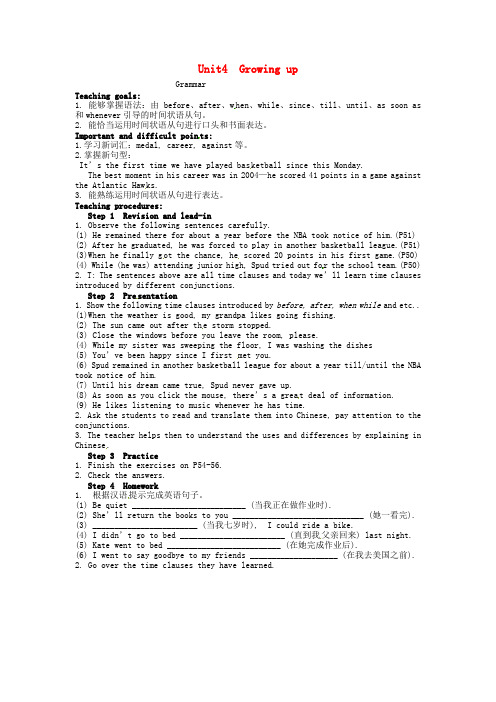
Unit4 Growing upGrammarTeaching goals:1. 能够掌握语法:由before、after、w hen、while、since、till、until、as soon as 和whenever引导的时间状语从句。
2. 能恰当运用时间状语从句进行口头和书面表达。
Important and difficult poin ts:1.学习新词汇:medal, career, against等。
2.掌握新句型:It’s the first time we hav e played bas ketball since this Monday.The best moment in his career was in 2004—he scored 41 points in a game against the Atlantic Haw ks.3. 能熟练运用时间状语从句进行表达。
Teaching procedures:Step 1 Revision and lead-in1. Observe the following sentences carefully.(1) He remained there for about a year before the NBA took notice of him.(P51)(2) After he graduated, he was forced to play in another basketball league.(P51)(3)When he finally g ot the chance, he scored 20 points in his first game.(P50)(4) While (he was) attending junior high, Spud tried out fo r the school team.(P50) 2. T: The sentences above are all time clauses and today we’ll learn time clauses introduced by different conjunctions.Step 2 Pre sentation1. Show the following time clauses introduced by before, after, when while and etc..(1)When the weather is good, my grandpa likes going fishing.(2) The sun came out after th e storm stopped.(3) Close the windows before you leave the room, please.(4) While my sister was sweeping the floor, I was washing the dishes(5) You’ve been happy since I first met you.(6) Spud remained in another basketball league for about a year till/until the NBA took notice of him.(7) Until his dream came true, Spud never gave up.(8) As soon as you click the mouse, there’s a grea t deal of information.(9) He likes listening to music whenever he has time.2. Ask the students to read and translate them into Chinese, pay attention to the conjunctions.3. The teacher helps then to understand the uses and differences by explaining in Chinese.Step 3 Practice1. Finish the exercises on P54-56.2. Check the answers.Step 4 Homework1. 根据汉语提示完成英语句子。
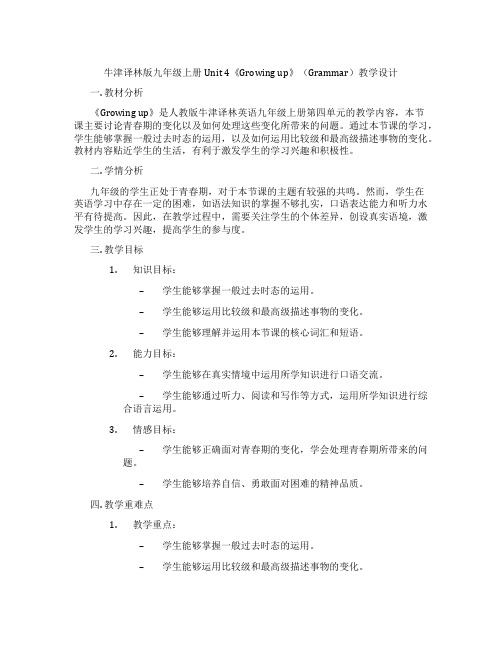
牛津译林版九年级上册Unit 4《Growing up》(Grammar)教学设计一. 教材分析《Growing up》是人教版牛津译林英语九年级上册第四单元的教学内容,本节课主要讨论青春期的变化以及如何处理这些变化所带来的问题。
通过本节课的学习,学生能够掌握一般过去时态的运用,以及如何运用比较级和最高级描述事物的变化。
教材内容贴近学生的生活,有利于激发学生的学习兴趣和积极性。
二. 学情分析九年级的学生正处于青春期,对于本节课的主题有较强的共鸣。
然而,学生在英语学习中存在一定的困难,如语法知识的掌握不够扎实,口语表达能力和听力水平有待提高。
因此,在教学过程中,需要关注学生的个体差异,创设真实语境,激发学生的学习兴趣,提高学生的参与度。
三. 教学目标1.知识目标:–学生能够掌握一般过去时态的运用。
–学生能够运用比较级和最高级描述事物的变化。
–学生能够理解并运用本节课的核心词汇和短语。
2.能力目标:–学生能够在真实情境中运用所学知识进行口语交流。
–学生能够通过听力、阅读和写作等方式,运用所学知识进行综合语言运用。
3.情感目标:–学生能够正确面对青春期的变化,学会处理青春期所带来的问题。
–学生能够培养自信、勇敢面对困难的精神品质。
四. 教学重难点1.教学重点:–学生能够掌握一般过去时态的运用。
–学生能够运用比较级和最高级描述事物的变化。
–学生能够熟练运用本节课的核心词汇和短语。
2.教学难点:–学生能够正确运用一般过去时态描述过去的事情。
–学生能够灵活运用比较级和最高级描述事物的变化。
五. 教学方法1.情境教学法:通过创设真实情境,让学生在实践中学习和运用语言。
2.任务型教学法:通过完成各种任务,提高学生的综合语言运用能力。
3.交际法:通过小组讨论、角色扮演等方式,增加学生之间的互动,提高口语表达能力。
六. 教学准备1.教学课件:制作课件,展示本节课的教学内容。
2.教学素材:准备相关听力、阅读和写作素材,帮助学生巩固所学知识。

牛津译林版英语九上Unit 4《Growing Up》(Grammar1)教学设计一. 教材分析牛津译林版英语九上Unit 4《Growing Up》主要讨论成长过程中的变化和经历。
本单元的Grammar 1部分主要引导学生理解并运用现在完成时态,通过照片和故事来描述自己成长过程中的变化和经历。
教材内容丰富,插图生动,有利于激发学生的学习兴趣和参与度。
二. 学情分析九年级的学生已经掌握了基本的英语语法知识,具备一定的听说读写能力。
他们对成长过程有自己的理解和体验,因此对于本节课的主题会感到熟悉和兴趣。
但部分学生对于现在完成时态的运用还不够熟练,需要老师在教学中给予指导和练习。
三. 教学目标1.让学生掌握现在完成时态的构成和用法。
2.培养学生用现在完成时态描述自己的成长经历和变化。
3.提高学生的听说读写能力,增强他们的英语综合运用能力。
四. 教学重难点1.现在完成时态的构成和用法。
2.如何运用现在完成时态描述自己的成长经历和变化。
五. 教学方法采用任务型教学法,让学生在实践中学习并掌握现在完成时态。
同时运用情境教学法,创设生动有趣的情境,让学生在真实的环境中运用英语。
六. 教学准备1.准备与成长过程相关的图片和故事。
2.设计相关的练习题和活动。
3.准备教学PPT。
七. 教学过程1.导入(5分钟)利用一张婴儿照片,引导学生谈论成长过程中的变化。
例如:“Look at this baby photo, can you guess who it is? Now let’s talk about the changes you’ve experienced since you wer e a baby.”2.呈现(10分钟)通过展示一张学生的成长照片,引出现在完成时态的概念和用法。
例如:“Look at this photo of XXX, we can see that XXX has grown a lot. Now let’s talk about XXX’s changes using the present perfect tense.”3.操练(10分钟)学生两人一组,互相描述对方的成长经历和变化。

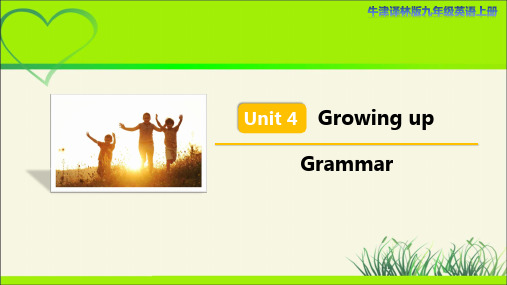

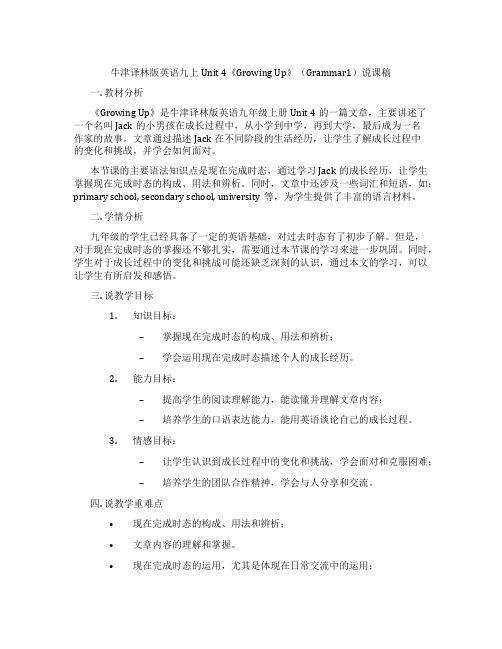
牛津译林版英语九上Unit 4《Growing Up》(Grammar1)说课稿一. 教材分析《Growing Up》是牛津译林版英语九年级上册Unit 4的一篇文章,主要讲述了一个名叫Jack的小男孩在成长过程中,从小学到中学,再到大学,最后成为一名作家的故事。
文章通过描述Jack在不同阶段的生活经历,让学生了解成长过程中的变化和挑战,并学会如何面对。
本节课的主要语法知识点是现在完成时态,通过学习Jack的成长经历,让学生掌握现在完成时态的构成、用法和辨析。
同时,文章中还涉及一些词汇和短语,如:primary school, secondary school, university等,为学生提供了丰富的语言材料。
二. 学情分析九年级的学生已经具备了一定的英语基础,对过去时态有了初步了解。
但是,对于现在完成时态的掌握还不够扎实,需要通过本节课的学习来进一步巩固。
同时,学生对于成长过程中的变化和挑战可能还缺乏深刻的认识,通过本文的学习,可以让学生有所启发和感悟。
三. 说教学目标1.知识目标:–掌握现在完成时态的构成、用法和辨析;–学会运用现在完成时态描述个人的成长经历。
2.能力目标:–提高学生的阅读理解能力,能读懂并理解文章内容;–培养学生的口语表达能力,能用英语谈论自己的成长过程。
3.情感目标:–让学生认识到成长过程中的变化和挑战,学会面对和克服困难;–培养学生的团队合作精神,学会与人分享和交流。
四. 说教学重难点•现在完成时态的构成、用法和辨析;•文章内容的理解和掌握。
•现在完成时态的运用,尤其是体现在日常交流中的运用;•对文章深层含义的理解,以及如何将文章内容与个人经历相结合。
五. 说教学方法与手段1.采用任务型教学法,让学生在完成任务的过程中,自然地学习和掌握现在完成时态;2.运用情境教学法,创设各种情境,让学生在实际情境中运用英语;3.利用多媒体教学手段,如图片、视频等,激发学生的学习兴趣,提高课堂效果。

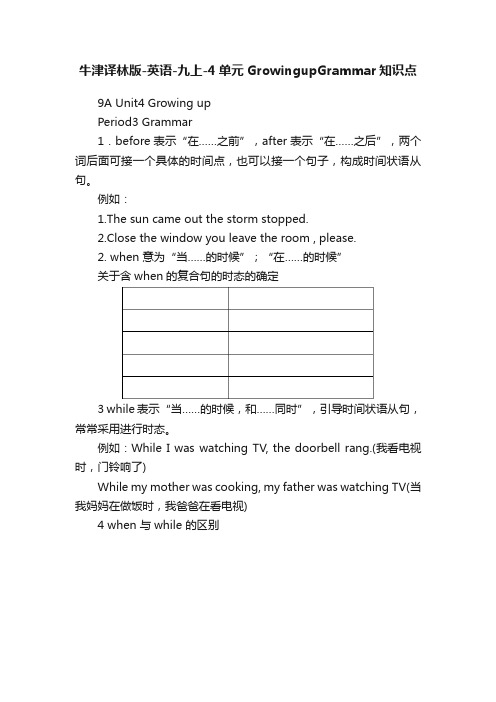
牛津译林版-英语-九上-4单元GrowingupGrammar知识点9A Unit4 Growing upPeriod3 Grammar1.before表示“在……之前”,after表示“在……之后”,两个词后面可接一个具体的时间点,也可以接一个句子,构成时间状语从句。
例如:1.The sun came out the storm stopped.2.Close the window you leave the room , please.2. when 意为“当……的时候”;“在……的时候”关于含when的复合句的时态的确定3 while表示“当……的时候,和……同时”,引导时间状语从句,常常采用进行时态。
例如:While I was watching TV, the doorbell rang.(我看电视时,门铃响了)While my mother was cooking, my father was watching TV(当我妈妈在做饭时,我爸爸在看电视)4 when 与while 的区别注意:如果从句动作和主句动作同时发生,并且从句动作为延续性动词时,when,while可以互换使用5. when ,while 引导时间状语从句,当主句与从句时态一致时,从句中出现的主语与be动词可以省略构成when/while + -ing结构。
e.g. : When (she is ) in trouble , she always asks for my help.While (I am ) travelling , I like to buy some souvenirs.【巩固】一在下列各句的空格中填入适当的连词1._________ he comes tomorrow, I shall ask where he has been.2._________ he was speaking, everybody listened carefully.3.I saw her just _________ she was getting off the train.4.Have a good look at that man _________ you pass him.5.It was already eight o'clock _________ we got there.1.由since引导的时间状语从句。
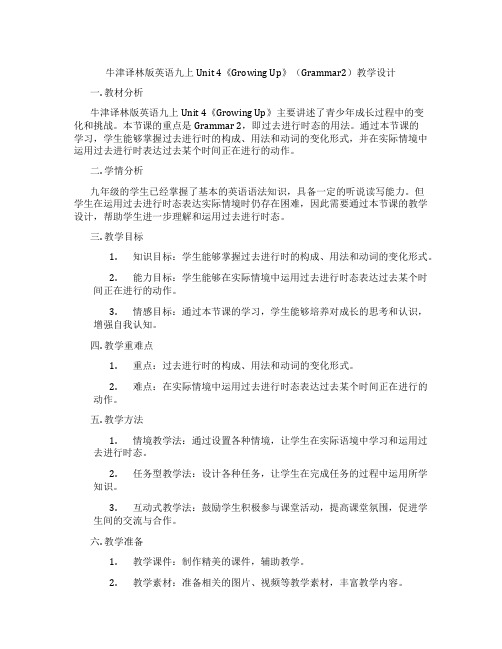
牛津译林版英语九上Unit 4《Growing Up》(Grammar2)教学设计一. 教材分析牛津译林版英语九上Unit 4《Growing Up》主要讲述了青少年成长过程中的变化和挑战。
本节课的重点是Grammar 2,即过去进行时态的用法。
通过本节课的学习,学生能够掌握过去进行时的构成、用法和动词的变化形式,并在实际情境中运用过去进行时表达过去某个时间正在进行的动作。
二. 学情分析九年级的学生已经掌握了基本的英语语法知识,具备一定的听说读写能力。
但学生在运用过去进行时态表达实际情境时仍存在困难,因此需要通过本节课的教学设计,帮助学生进一步理解和运用过去进行时态。
三. 教学目标1.知识目标:学生能够掌握过去进行时的构成、用法和动词的变化形式。
2.能力目标:学生能够在实际情境中运用过去进行时态表达过去某个时间正在进行的动作。
3.情感目标:通过本节课的学习,学生能够培养对成长的思考和认识,增强自我认知。
四. 教学重难点1.重点:过去进行时的构成、用法和动词的变化形式。
2.难点:在实际情境中运用过去进行时态表达过去某个时间正在进行的动作。
五. 教学方法1.情境教学法:通过设置各种情境,让学生在实际语境中学习和运用过去进行时态。
2.任务型教学法:设计各种任务,让学生在完成任务的过程中运用所学知识。
3.互动式教学法:鼓励学生积极参与课堂活动,提高课堂氛围,促进学生间的交流与合作。
六. 教学准备1.教学课件:制作精美的课件,辅助教学。
2.教学素材:准备相关的图片、视频等教学素材,丰富教学内容。
3.练习题:设计各种练习题,巩固所学知识。
七. 教学过程1.导入(5分钟)利用图片或视频展示青少年成长过程中的变化,引导学生谈论成长过程中的挑战和收获。
激发学生的学习兴趣,为接下来的语法学习做好铺垫。
2.呈现(10分钟)介绍过去进行时的构成、用法和动词的变化形式。
通过示例句子,让学生理解过去进行时态表示过去某个时间正在进行的动作。


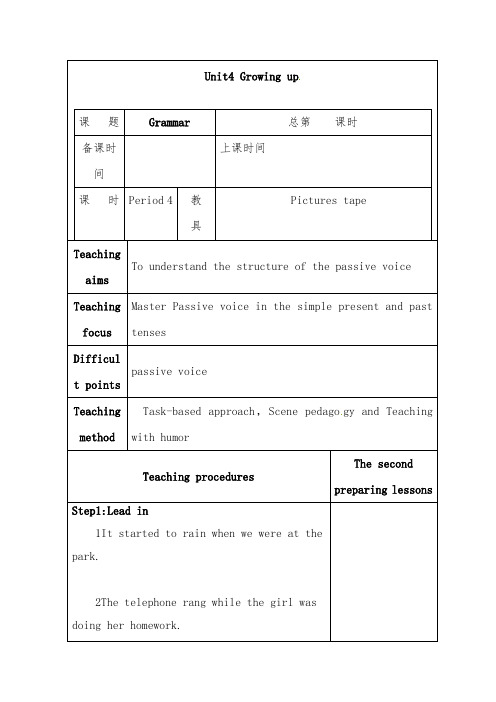

Unit 4 Growing up
尊敬的读者:
本文由我和我的同事在百忙中收集整编出来,本文档在发布之前我们对内容进行仔细校对,但是难免会有不尽如人意之处,如有疏漏之处请指正,希望本文能为您解开疑惑,引发思考。
文中部分文字受到网友的关怀和支持,在此表示感谢!在往后的日子希望与大家共同进步,成长。
This article is collected and compiled by my colleagues and I in our busy schedule. We proofread the content carefully before the release of this article, but it is inevitable that there will be some unsatisfactory points. If there are omissions, please correct them. I hope this article can solve your doubts and arouse your thinking. Part of the text by the user's care and support, thank you here! I hope to make progress and grow with you in the future.。

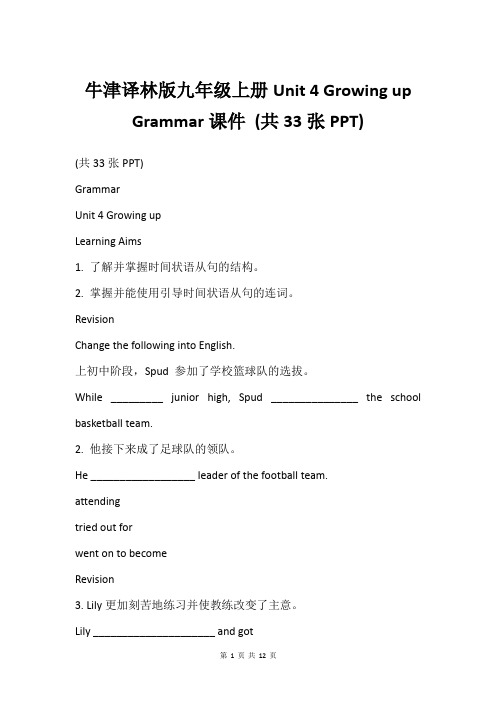
牛津译林版九年级上册Unit 4 Growing up Grammar课件(共33张PPT)(共33张PPT)GrammarUnit 4 Growing upLearning Aims1. 了解并掌握时间状语从句的结构。
2. 掌握并能使用引导时间状语从句的连词。
RevisionChange the following into English.上初中阶段,Spud 参加了学校篮球队的选拔。
While _________ junior high, Spud _______________ the school basketball team.2. 他接下来成了足球队的领队。
He __________________ leader of the football team.attendingtried out forwent on to becomeRevision3. Lily更加刻苦地练习并使教练改变了主意。
Lily _____________________ and gotthe coach ______________________.4. 没有大学愿意邀请他去打篮球,仅仅因为他的身高。
No university _____________________basketball only ____________ his height.practised even harderto change his mindwould invite him to playbecause ofRevision5. 在他毕业以后,他被迫在另一个篮球联盟效力。
_______ he _________, he ___________________ in another basketball league.6. 通过努力,他证明个头和体型真的不重要—如果你决不放弃,几乎没有什么不能做到的。
_________ hard work, he _______ that _________________ really do not ________, —you can do almost anything ifyou never ____________.After graduated was forced toplayThroughprovedsize and body typemattergive upGrammarA Using before, after, when and whileBefore means earlier than a certain time.e.g. He remained there for about a yearbefore the NBA took notice of him.After means later than a certain time.e.g. After he graduated, he was forced toplay in another basketball league.GrammarWhen means at or during a certain time.e.g. When he finally got the chance, hescored 20 points in his first game.While means during a certain time.e.g. While (he was) attending junior high,Spud tried out for the school team.GrammarOne of David’s daysDavid is writing in his diary about one of his days. Help him combine his sentences using before, after, when or while.I go jogging every morning. Then I have breakfast.________________________________I go jogging every morning before I have breakfast.Grammar2. I practised playing basketball for hours. I felt tired out._______________________________3. I met Peter. I was waiting at the bus stop._______________________________After I practised playing basketball for hours, I felt tired out.I met Peter while I was waiting at the bus stop.Grammar4. I was watching TV. I received a call from my uncle.__________________________________________________________________5. I was ready to go to bed. My father came back from work._________________________________While I was watching TV, I received a call from my uncle.I was ready to go to bed when my father came back from work.I was watching TV when I received a call from my uncle.Grammare.g. You’ve been happy since I first met you.B Using since, till and untilSince means from a certain time. The verb in the main clause is oftenused in the present perfect tense.Till and until mean up to a certain time. Until can be placed at the beginning or in the middle of the sentence, but till is usually used in the middle of the sentence.Grammare.g. Spud remained in another basketball league for about a year till/ until the NBA took notice of him.Until his dream came true, Spud never gave up.When we use the structure not…until, we cannot use till instead of until.e.g. Don’t wake me up until you finish your work.GrammarDavid loves basketballHere are more sentences from David’s diary entry. Complete his sentences with since, till or until.I have been crazy about playing basketball ________ I was a little boy.2. The weather has been awful this week.The rain did not stop _______ yesterday evening, so we could not practise basketball for several days.sinceuntilGrammar3. We played basketball in theplayground this afternoon _________it was getting dark.4. It is the first time we have playedbasketball _________ Monday. Weenjoyed ourselves very much.until/ tillsinceGrammar5. I waited for 20 minutes at the bus stop_________ the bus arrived.6. It is Friday evening. I will not go tobed __________ I finish watching myfavourite TV programme.until/ tilluntilGrammare.g. It began to rain as soon as I left the house.C Using as soon as and wheneverAs soon as means when something happens, or a short time after something has happened.Whenever means at any time.e.g. I can read books whenever I want to.GrammarMore about basketballSimon is writing about David’s love for basketball. Help Simon complete his sentences with as soon as or whenever.David often goes to play basketball_______________ school is over.2. He watches the NBA ____________there is a game on TV.wheneveras soon asGrammar3. ________________ he talks aboutbasketball, he gets excited.4. ________________ he learnt that theNBA players would come to China, hetried his best to get a ticket.WheneverAs soon asGrammar1、before, after, when, while, till, until, as soon as, whenever引导的时间状语从句中,如果主从句都是将来发生的动作,主句用一般将来时,从句用一般现在时。

Unit4 Growing upGrammar1.I felt tired out.我感觉筋疲力尽。
(1)tired out 筋疲力尽的常用于连系动词后作表语be tired out.他们又冷又饿,疲惫不堪。
They were cold,hungry and tired.【拓展】be tired of...厌倦/厌烦...·Are you tired of sitting too long你厌倦久坐了吗?2.It is the first time we have played basketball since Monday.这是自周一以来我们第一次打篮球(1)It is + the + 序数词+time + that 从句.表示这是...第...次...",其中从句通常用现在完成时,且that 在口语中常省略。
It is the first time that I have met her.这是我第一次遇见她。
【拓展】类似的句式还有:This/That is + the +序数词+time + that 从句这/那是...第...次...This is the second time that Mr Smith has visited China.这是史密斯先生第二次到中国旅游。
3.... but he did not bee serious about basketball till/until he was 12....但是直到12岁他才认真对待篮球。
(1)serious adj.严肃的;认真的seriously[副词]严肃地;认真地be/bee serious about sb./( doing) sth.认真对待某人/(做)某事Be serious for a moment; that is important.严肃点儿,这件事很重要。
Are you serious?你是认真的吗?He was very serious about studying.他学习很认真。